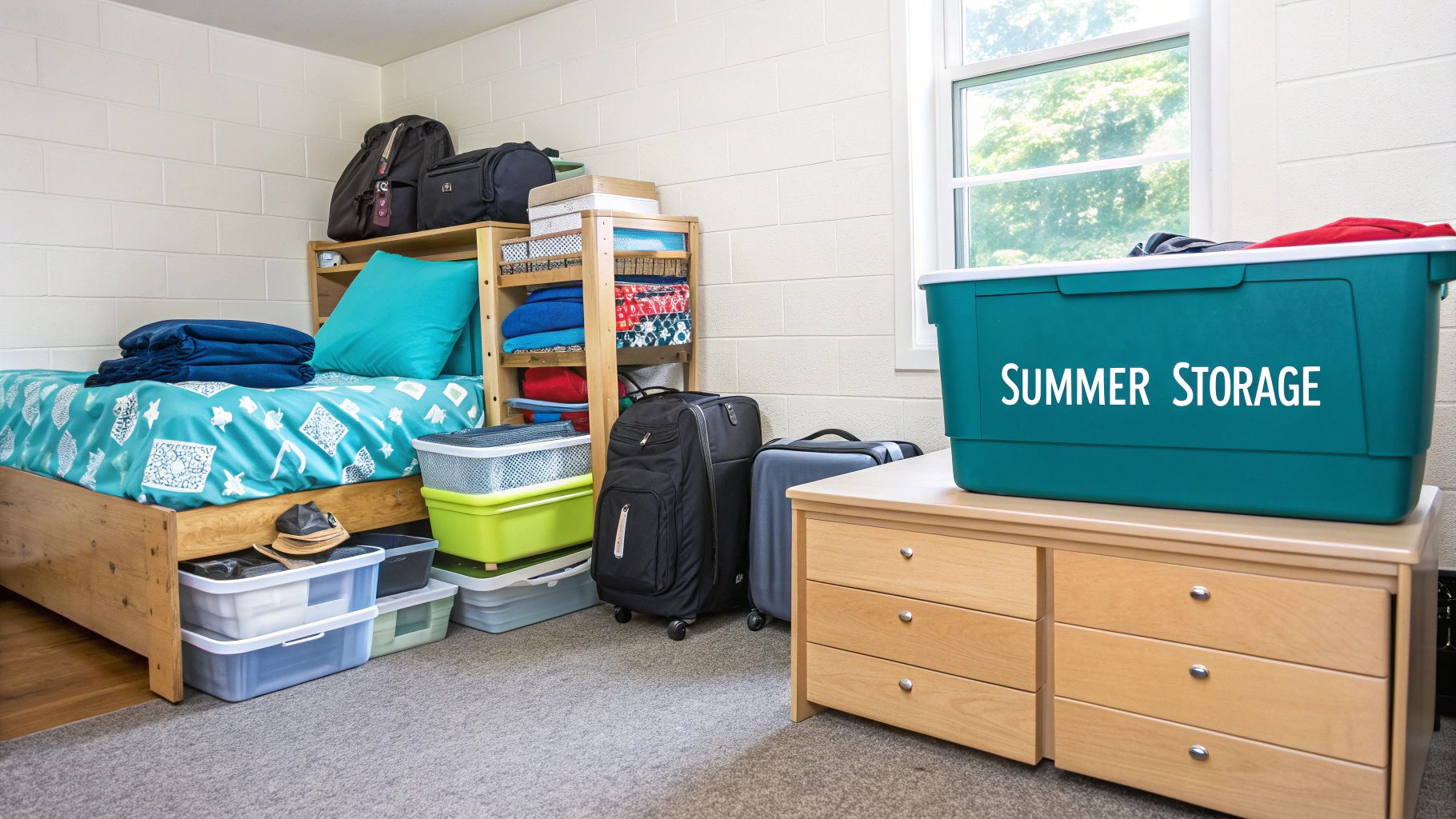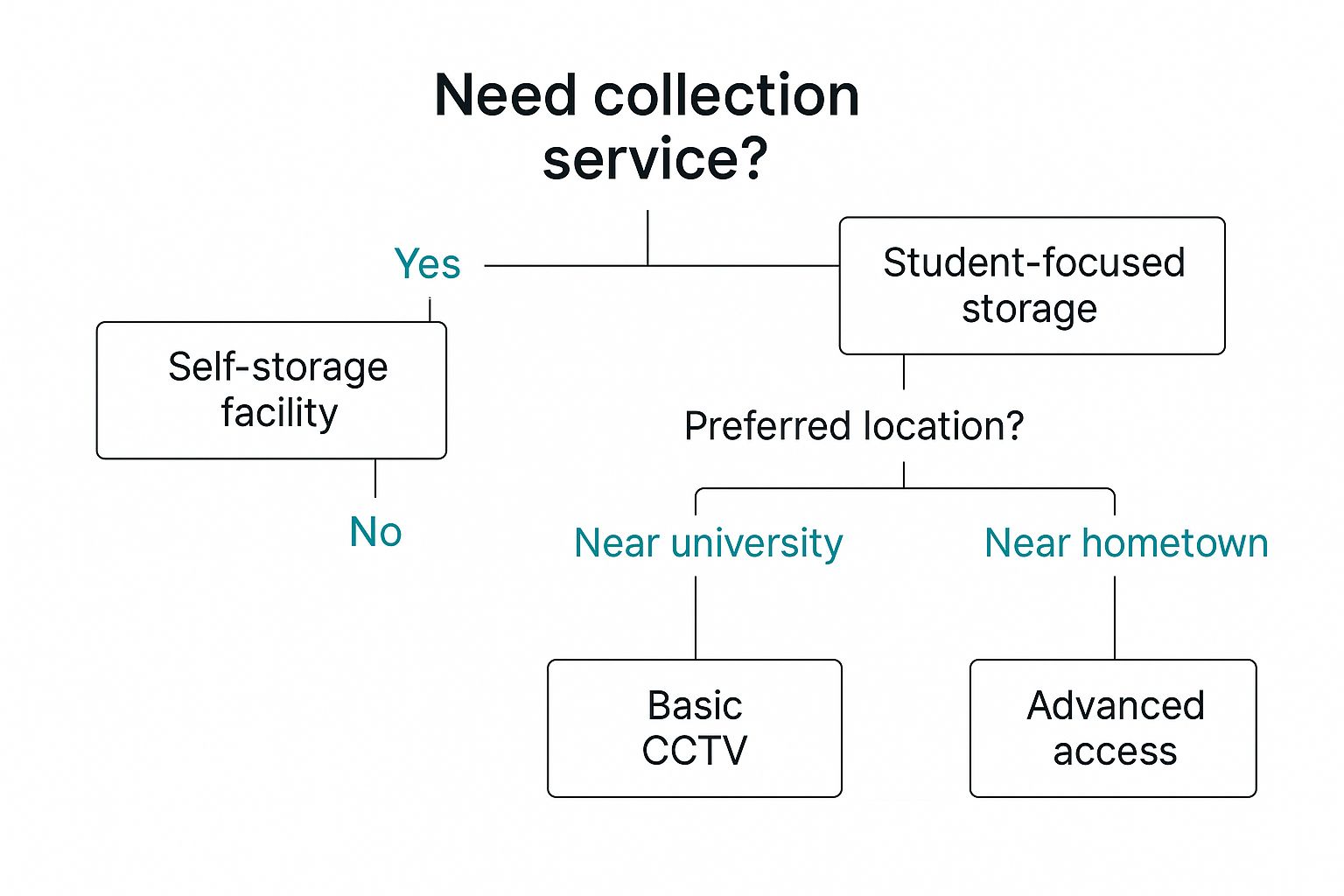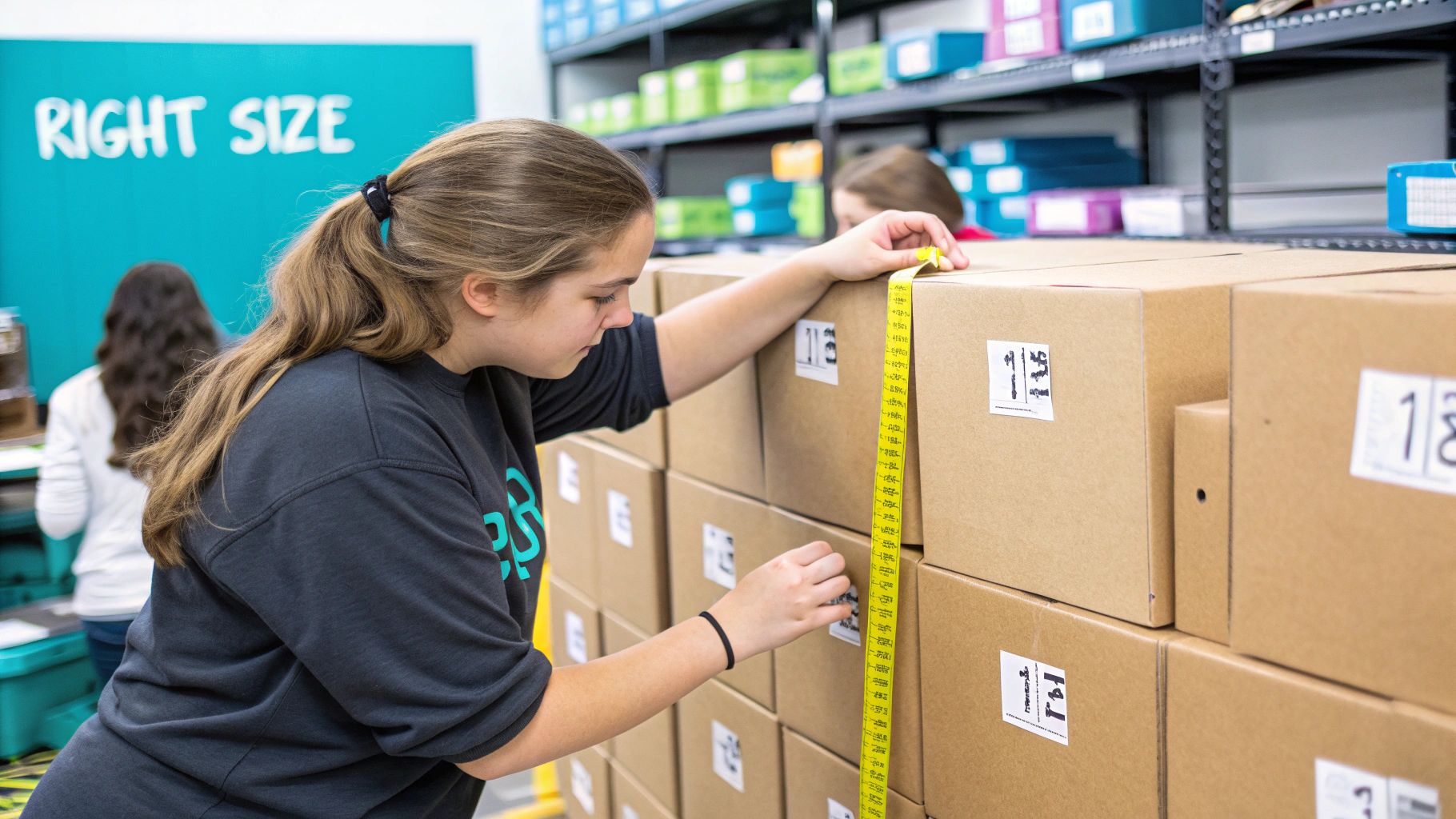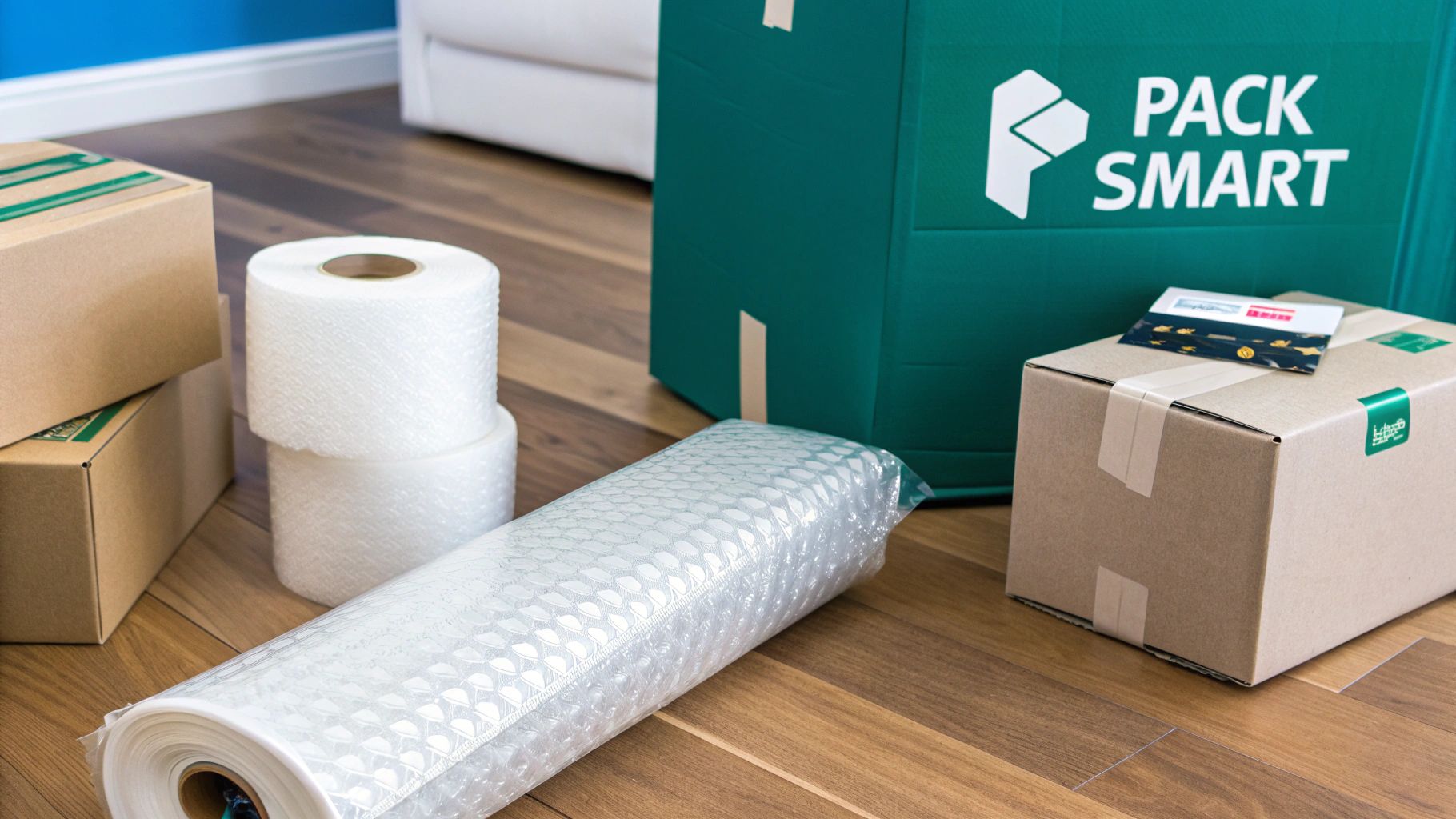The end of term always brings up the same old puzzle for students all over the UK: what on earth do you do with all your stuff over the summer? For many, summer storage for students is the perfect solution. It offers a secure home for your belongings between tenancies or while you're back home, saving you the headache of lugging everything across the country.
Why Summer Storage Is a Lifesaver for Students

As the academic year winds down, the chaos of moving out of university halls or student housing kicks in. Trying to cram everything into your parents' car or hiring a van for a long trip is often unrealistic and expensive, especially with bulky items like furniture, kitchen gadgets, and all those winter coats.
This is where having a solid storage plan makes all the difference. It isn't just about finding a space; it's about creating a smooth transition from term-time to your summer break. It ensures your belongings are safe, sound, and out of the way until you need them again in September.
Common Student Scenarios
Whether you're moving into a new shared house next term or heading abroad for the summer, a storage unit provides a reliable fix. Think about these common situations where student storage proves its worth:
- Moving between tenancies: If your current lease ends before the new one starts, a unit acts as a secure holding space.
- International students: Hauling everything home for a few months is usually out of the question, making local storage the only sensible choice.
- Decluttering your family home: You can avoid turning your parents’ garage or spare room into a dumping ground for your university clutter.
The need for extra space is a real trend. Recent research shows that over half (54.4%) of young UK consumers use self storage because they simply lack space at home. This really highlights the demand for affordable, secure solutions.
A well-organised storage unit cuts through the end-of-term chaos. It turns a stressful, multi-day move into a manageable task, giving you more time to focus on exams and your summer plans.
Ultimately, using student storage is about buying yourself some peace of mind. Knowing your possessions are locked up tight in a secure facility means you can properly switch off and enjoy your summer without a single worry. Exploring the different types of self storage available can help you find the perfect fit for your needs and budget.
How to Choose the Right Student Storage
Choosing the right provider for your summer storage involves more than just a quick search for the cheapest price tag. The best option is a careful balance of convenience, security, and cost that fits what you actually need, whether you're heading home for the break or just moving between student flats.
Your first big decision is usually between a traditional self-storage facility and one of the student-focused collection services. Traditional units offer direct access and control, letting you pop in whenever you like. On the other hand, collection services handle all the heavy lifting and transport, which is a lifesaver if you don't have a car.
Comparing Student Storage Options
To help you weigh up the pros and cons, here’s a quick comparison of the two main types of student storage services.
| Feature | Traditional Self-Storage | Student Collection Service |
|---|---|---|
| Convenience | You transport everything yourself. Great for control. | Door-to-door collection and delivery. Utterly hassle-free. |
| Access | You can access your unit anytime during opening hours. | No direct access to items once collected. |
| Cost | You pay for a set unit size, whether you fill it or not. | Often a per-box or per-item pricing model. Can be cheaper. |
| Flexibility | Great for various item sizes, from a desk to a TV. | Best for standard-sized boxes and smaller items. |
| Best For | Students with cars or lots of bulky/awkward items. | Students without transport or those prioritising pure ease. |
Ultimately, your choice depends on how much stuff you have, whether you have a car, and how much hands-on involvement you want in the process.
Location Is a Key Factor
Where you stash your stuff for the summer really matters. Storing near your university is incredibly handy for moving everything in and out at the start and end of term. But, if you think you might need to grab something over the holidays, a unit closer to your family home could be a smarter move.
Accessibility is another point to consider. Check the facility’s opening hours to make sure they work with your schedule, especially during that chaotic last week of term. Some places offer 24-hour access, but many have set hours, so it's a detail worth double-checking. Our guide on how to choose the best storage facility when moving house has more detailed advice on weighing up these location-based factors.
Thinking through these questions can simplify the whole process. This infographic helps visualise the main choices you'll face.

As the infographic shows, your priorities—be it convenience, location, or the level of security—will point you towards the most suitable storage solution.
Security and Service Differences
Security should be right at the top of your checklist. Look for facilities that offer more than just a simple padlock on a door. Key features to ask about include:
- 24/7 CCTV Monitoring: Is the entire facility covered, or just the main entrance?
- Secure Access Controls: Do they use individual keypads, fobs, or unique codes for entry?
- On-Site Staff: Having staff present during opening hours adds a massive layer of security and support.
The UK self storage market is growing to meet this demand, especially since over 60% of UK students move at least once during their degree. This expansion means more options and better facilities are popping up, many catering specifically to the short-term needs of students between tenancies.
Don't underestimate the value of good security. Your belongings, from your laptop to your essential textbooks, are valuable assets for your studies. Paying a little extra for a facility with robust security measures provides crucial peace of mind while you're away.
By carefully considering these points, you can move beyond just finding a space and instead choose a reliable, secure, and convenient service. This proactive approach ensures your belongings are well-protected, allowing you to properly enjoy your summer break without any lingering worries.
Selecting Your Unit Size and Budgeting Smartly
The first question every student asks is, "How much space do I actually need?" It's a critical one, because getting it wrong is the quickest way to overspend. Paying for a unit that's half-empty is a classic mistake, but it's easily avoided with a bit of savvy planning.

It’s tough to picture what something like ‘25 square feet’ looks like in real life. A simple trick is to compare it to your uni room. A 25 sq ft unit, which is about the size of a small garden shed, is usually spot-on for everything you'd have in a standard halls room. Think several boxes, a desk chair, a mini-fridge, and your suitcases – it'll all fit comfortably.
Moving out of a shared flat? You'll probably want a bit more breathing room. A 50 sq ft unit is closer to a large walk-in wardrobe and can easily handle the contents of a small one-bedroom flat. That includes bigger items like a double bed, a small sofa, and plenty of boxes. Don't just guess, though. For a much more accurate idea, give a storage calculator a try. It helps you match your stuff to the perfect unit size without the guesswork.
Understanding the Costs Involved
Once you know the size you need, you can start digging into prices. But the cost of summer storage isn't just about the weekly or monthly fee. A few other things will shape the final quote you get.
- Location: Unsurprisingly, facilities closer to city centres or right next to campus tend to be pricier due to high demand.
- Rental Duration: Most places offer better deals for longer stays. For a typical three-month summer break, you'll likely be on a standard short-term rate.
- Special Offers: Always keep an eye out for a good deal. Many providers, including us here at Shield Self Storage, have introductory offers like your first month for just £1.
When you get a quote, read the small print. Does it include everything? Hidden costs for locks, insurance, or admin fees can be a nasty surprise. A trustworthy company will be upfront and give you a clear breakdown of all charges.
Budgeting Tips for Savvy Students
Being on a student budget doesn't mean you have to settle for less. With a bit of forward planning, you can get fantastic value storage.
First off, don't be shy about asking for student discounts. Loads of facilities offer special pricing if you've got a valid university ID, but they don't always shout about it. A quick phone call could save you a decent chunk of cash over the summer.
Sharing a unit with a mate you trust is one of the smartest cost-cutting moves you can make. A larger unit is often cheaper per square foot than a smaller one, so splitting the bill can lead to big savings for both of you. Just make sure you agree on who can access it and how you'll handle payments beforehand.
Finally, book your unit early. Storage spots near universities get absolutely mobbed at the end of term. If you can book four to six weeks in advance, you’ll not only guarantee yourself a spot but also lock in a better price before the last-minute rush sends rates soaring. This one simple step can make a massive difference to your final bill.
Your Smart Packing and Organisation Guide

Smart packing isn’t just about playing Tetris with your life’s belongings. It’s about making sure everything you own is protected and that the move back to uni is completely painless. Get the packing and organisation right, and you’ll turn a chaotic chore into a smooth, stress-free job.
Your approach here will determine whether your things emerge from storage in pristine condition or a jumbled mess. With a few simple techniques, you can ensure everything from your laptop to your favourite jumper is ready for the new term.
Sourcing Your Packing Essentials
Before a single item goes into a box, you need the right tools for the job. You can often get sturdy, used boxes for free from local supermarkets or shops—just pop in and ask nicely. If not, most storage facilities sell packing materials specifically designed for the task.
Here are the absolute must-haves for your packing mission:
- Strong Boxes: Get a mix of sizes, but whatever you do, avoid filling large boxes with heavy stuff like books. You’ll thank yourself later when you can actually lift them.
- Bubble Wrap or Packing Paper: Absolutely essential for protecting fragile items like glassware, mirrors, and electronic screens.
- Durable Packing Tape: Don't skimp on this. Good quality tape is the difference between a secure box and a disaster waiting to happen.
- Marker Pens: This is non-negotiable. Labelling will save you hours of frustration when you’re trying to find your kettle in a sea of identical brown boxes.
Getting these basics sorted first sets you up for an organised and efficient packing session, turning a dreaded chore into a manageable project.
The Dos and Don'ts of Storing Your Items
How you pack certain items makes a massive difference to their condition after three months in storage. Electronics need protection from moisture, clothes need to breathe, and fragile kitchenware needs careful wrapping to avoid chips and cracks.
Think of it this way: your storage unit is a temporary home for your belongings, so you need to prepare them properly for their stay.
Pro Tip: Before you unplug any electronics like your laptop, games console, or TV, snap a quick photo of the cable setup. It’ll make reconnecting everything a breeze when you’re setting up your new room.
Remember that a little prep goes a long way. Wiping down surfaces and making sure everything is bone dry before it goes into a box is the key to preventing mildew and musty smells from developing over the summer.
Packing Strategies for Common Student Items
A systematic approach doesn't just protect your belongings; it makes unpacking a million times easier. For example, always pack books in smaller boxes to keep the weight down and lay them flat to avoid damaging their spines.
For clothes, vacuum-sealed bags are a brilliant space-saver, but be careful with delicate fabrics. Natural fibres like wool and cotton need to breathe, so it’s better to store them loosely in a breathable container or a sturdy box. Tossing in a few cedar balls or lavender sachets is a great trick to deter pests and keep everything smelling fresh.
When it comes to kitchenware, organisation is everything. Here’s a quick checklist to get you started on the essentials.
Student Packing Essentials Checklist
This table breaks down the key items you'll need and how to pack them like a pro.
| Category | Essential Items | Packing Tip |
|---|---|---|
| Boxes & Protection | Sturdy Boxes, Bubble Wrap, Packing Paper | Use small boxes for heavy items like books. Wrap fragile items individually. |
| Securing & Labelling | Strong Packing Tape, Marker Pens | Seal boxes on the top and bottom. Label the top and sides with contents and the room. |
| Kitchenware | Plates, Glasses, Mugs, Cutlery | Stack plates vertically. Stuff glasses with paper before wrapping. Bundle cutlery. |
| Electronics | Laptop, TV, Console, Cables | Use original boxes if possible. Take photos of cable setups before unplugging. |
| Clothing & Bedding | Clothes, Duvets, Pillows, Towels | Use vacuum bags for bulky items but let natural fibres breathe in boxes. |
| Books & Stationery | Textbooks, Notebooks, Files | Pack books flat in small boxes to protect their spines and manage weight. |
| Personal Items | Photos, Mementos, Small Decor | Wrap sentimental items carefully and place them in a clearly marked box. |
With your supplies ready, it’s time to get specific.
For kitchen items:
- Plates: Wrap each one in packing paper and stack them vertically in the box, like records in a crate. This distributes pressure evenly and seriously reduces the risk of breakages.
- Glasses and Mugs: Stuff crumpled paper inside each one before wrapping the outside. Place them rim-down in a box, ideally with cardboard dividers.
- Cutlery: Bundle forks, spoons, and knives together with an elastic band and then wrap the bundle so nothing gets lost.
Finally, the most important step of all is to label everything clearly. Be specific! Write the contents and the destination room (e.g., "Kitchen – Mugs & Glasses") on the top and sides of every single box. An organised labelling system is your secret weapon for a fast and stress-free unpacking experience when you get back to uni.
Mastering Your Move-In and Move-Out Logistics
Let’s be honest, getting all your stuff from your flat to a storage unit can feel like the most stressful part of the whole process, especially with exams breathing down your neck. The secret is tackling the logistics head-on with a clear plan. It’s the best way to avoid a last-minute panic.
Your first big decision is transport. If you don't have a car, a local 'man with a van' service is often a brilliant, cost-effective option for a few hours of work. On the other hand, many student-focused storage companies now offer a collection service, which completely simplifies move-in day.
Scheduling Your Move Strategically
Timing is everything. The last week of term is notoriously chaotic, with thousands of students all trying to move out at once. To sidestep the madness, try scheduling your move-in for a weekday, either a week before or just after the main moving weekend. Booking your transport and unit well in advance not only secures your spot but often lands you a better price.
If you're sharing a unit with flatmates, good coordination is essential. Set up a shared calendar or a group chat to pick a moving day that works for everyone. This means you can pool your resources for transport and help each other with the heavy lifting, making the day much smoother.
Plan your move-out day at the end of summer with the same care. Book your transport early and confirm your storage facility's access hours to ensure a seamless transition back into your new accommodation for the next academic year.
Finalising Your Contract and Insurance
Before you lock up your unit, take a moment to double-check your paperwork. Your contract should clearly state the rental period, cost, and any notice you need to give before moving out. This is also the perfect time to confirm your insurance details. Most facilities require it, and it’s a small price to pay for the peace of mind that your belongings are protected.
The UK's student accommodation market has boomed, and the rise in purpose-built student housing has massively increased the demand for these kinds of services. More students now find themselves needing summer storage for students to bridge the gap between tenancy agreements, which makes getting the logistics right more important than ever. You can learn more about the evolving needs of the student storage market from recent industry analysis.
Finally, think about the move-out process at the end of summer. Get your collection or van hire arranged in August, well before the September rush kicks off. A little bit of organisation at both ends of the summer break guarantees a stress-free experience, letting you focus on your studies and actually enjoying your time off.
Got Questions About Student Summer Storage?
Heading off for the summer is exciting, but figuring out storage for the first time can throw up a few questions. Don't worry, it's simpler than it looks. We’ve put together answers to the queries we hear most often from students.
Do I Really Need Insurance for My Stuff?
Yes, you absolutely do. Think of it as a non-negotiable. Most storage places will require it, and honestly, it’s just smart planning. While facilities have top-notch security, their own insurance doesn't cover your personal belongings if something unexpected happens.
You can usually get a very affordable policy directly from the storage provider when you book. Another route is to check your parents' home insurance policy – sometimes it covers items stored elsewhere. Just make sure to confirm the details, especially any limits on the value of items stored off-site. It's a small price for a lot of peace of mind.
What Can't I Put in a Storage Unit?
For everyone's safety, there are some common-sense restrictions on what you can store. You'll need to leave these things out of your boxes:
- Perishables: Anything that can go off, like food and drinks. No one wants to come back to a nasty surprise.
- Flammable or hazardous materials: This means aerosols, paint, petrol, cleaning chemicals, and anything else that could be a risk.
- Illegal items or weapons.
- Living things: This includes your pot plants and any pets.
It’s also a good idea to keep highly sentimental items or essential documents like your passport with you. When in doubt, just ask the facility manager for their specific list of prohibited items before you pack.
The best policy is to be upfront about what you're storing. A quick chat with the facility manager can clear up any confusion and make sure you're following the rules. It keeps your things, and the whole facility, safe.
Is It a Good Idea to Share a Unit with Mates?
Sharing a unit is a classic student move for a reason – it’s a brilliant way to save money. If you team up with a couple of trusted friends, you can split the cost of a slightly larger unit and each pay far less than you would for individual small ones.
Just make sure you set some ground rules first. Figure out whose name will be on the contract, how you’ll split the bill, and who can access the unit. And label every single one of your boxes clearly. You’ll thank yourself when you’re not sorting through someone else’s kitchen stuff at the end of the summer.
How Early Should I Book My Unit?
Our best advice? Book your unit at least four to six weeks before term ends. You’re not the only one with this idea. Storage facilities near universities get incredibly busy from May onwards as thousands of students are all trying to move out at once.
Booking early doesn't just guarantee you get a spot; it often means you can snag early-bird discounts and have a better choice of unit sizes. Leaving it until the last minute is a recipe for stress, higher prices, and slim pickings – exactly what you don't need during exam season.
Planning your student storage should be the easiest part of your summer break. At Shield Self Storage, we offer secure, affordable, and flexible solutions that are perfect for students. Get a fast quote online today and tick one more thing off your to-do list.



